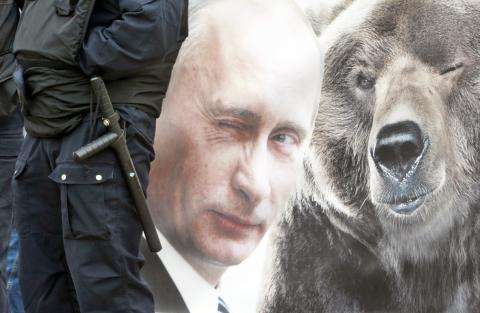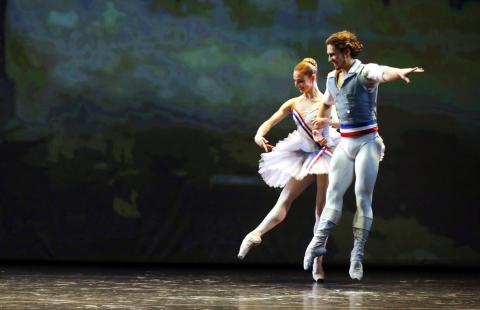After the media, the oligarchs and the opposition, Vladimir Putin’s Russia is turning up the heat on the arts, with a “blasphemous” opera, a raunchy teen dance show and an “insulting” Hollywood film all taking fire.
Claiming a mission to protect the sensibilities of the Russian people, the Kremlin and the Orthodox Church are leaning on artists to imbue their creations with greater morality.
The attacks go over well in a society steeped in the conservative anti-Western values preached by Putin, who has been isolated by the West over the Ukraine crisis.

Photo: AP
Since the Russian strongman burst onto the center stage in 1999, several groups have been called to heel, from journalists to business magnates and human rights activists.Now the authorities’ sights are trained on the cultural sector, with the government keen to promote a new approach.
“The time has come to formulate our own vision of ourselves as heirs to Russia’s great, unique civilization,” Culture Minister Vladimir Medinsky said, explaining the recent banning of the release of the Hollywood thriller Child 44, about a serial killer operating in Joseph Stalin’s Russia.
The minister accused the film, which stars Vincent Cassel and Gary Oldman, of the “distortion of historical facts” and depicting Soviet Army officers as “blood-thirsty ghouls”.

Photo: EPA
A few weeks before that, the object of popular wrath was the head of the state-funded Novosibirsk State Opera and Ballet Theater.
Boris Mezdrich was fired for sensationally depicting Jesus Christ as a character in an erotic movie in his production of Richard Wagner’s opera Tannhaeuser, triggering an outcry from spectators and the church.
Other productions or works to cause a furore this year included a mural by a street artist in the eastern city of Perm showing the first man in space, Russia’s Yuri Gagarin, as a “Jesus of science,” being crucified.
The artist faces up to one year in prison. An exhibition by Canadian artist Frank Rodick of pictures of his dead mother also caused scandal, with church authorities in the Baltic Sea exclave of Kaliningrad calling for “limits on what is tolerable in art”.
In another vein entirely, three teens filmed twerking in front of a World War II memorial were sentenced to up to 15 days imprisonment.The sentencing came after a video of girls in leotards twerking at a dance school in the southwestern city of Orenburg went viral, prompting the Investigative Committee to launch an indecency probe.
‘WE MUST PROTECT OURSELVES’
Artists whose work is deemed “blasphemous” also face having the book thrown at them.
In July 2013, lawmakers adopted legislation making it a crime to insult believers’ feelings, punishable by up to three years in prison. From a dozen cases in 2013 the number of prosecutions under the law rose to around 50 last year.
For film director Sergei Selyanov, producer of animated films inspired by Russian folklore, the “censorship aims to fill the void left by the (loss of an) historic national identity, which was buried together with the USSR”.
The current concept of Russian nationhood, said Konstantin Remchukov, chief editor of the Nezavisimaya Gazeta daily, is based on “two obligatory elements, patriotism and anti-Westernism.” Hostility to the West has flourished among both the elite and ordinary Russians, who have been fed a staple diet of anti-Western fare by the media over the Ukraine crisis and the legalization of gay marriage in several countries.
A troupe of actors from the western city of Pskov recently came out swinging — against a play in which they themselves were cast.
One of the actors, Sergei Popkov, took issue with the character of a dwarf who becomes king, seeing in it an “allusion to our president.”
“We must protect ourselves...against the West which wants to destroy everything here,” he said, demanding a return to Soviet-style cultural censorship.
World War II, or the Great Patriotic War as Russians call it, is a prime example of a sacrosanct subject, where self-censorship is exercised. Bookshops in Moscow recently pulled their copies of Art Spiegelman’s Pulitzer prize-winning graphic novel about a Holocaust survivor, Maus, because it features a swastika on the cover.
With parliament having adopted a law in December banning Nazi propaganda the stores decided to play safe rather than risk prosecution.

That US assistance was a model for Taiwan’s spectacular development success was early recognized by policymakers and analysts. In a report to the US Congress for the fiscal year 1962, former President John F. Kennedy noted Taiwan’s “rapid economic growth,” was “producing a substantial net gain in living.” Kennedy had a stake in Taiwan’s achievements and the US’ official development assistance (ODA) in general: In September 1961, his entreaty to make the 1960s a “decade of development,” and an accompanying proposal for dedicated legislation to this end, had been formalized by congressional passage of the Foreign Assistance Act. Two

Despite the intense sunshine, we were hardly breaking a sweat as we cruised along the flat, dedicated bike lane, well protected from the heat by a canopy of trees. The electric assist on the bikes likely made a difference, too. Far removed from the bustle and noise of the Taichung traffic, we admired the serene rural scenery, making our way over rivers, alongside rice paddies and through pear orchards. Our route for the day covered two bike paths that connect in Fengyuan District (豐原) and are best done together. The Hou-Feng Bike Path (后豐鐵馬道) runs southward from Houli District (后里) while the

March 31 to April 6 On May 13, 1950, National Taiwan University Hospital otolaryngologist Su You-peng (蘇友鵬) was summoned to the director’s office. He thought someone had complained about him practicing the violin at night, but when he entered the room, he knew something was terribly wrong. He saw several burly men who appeared to be government secret agents, and three other resident doctors: internist Hsu Chiang (許強), dermatologist Hu Pao-chen (胡寶珍) and ophthalmologist Hu Hsin-lin (胡鑫麟). They were handcuffed, herded onto two jeeps and taken to the Secrecy Bureau (保密局) for questioning. Su was still in his doctor’s robes at

Mirror mirror on the wall, what’s the fairest Disney live-action remake of them all? Wait, mirror. Hold on a second. Maybe choosing from the likes of Alice in Wonderland (2010), Mulan (2020) and The Lion King (2019) isn’t such a good idea. Mirror, on second thought, what’s on Netflix? Even the most devoted fans would have to acknowledge that these have not been the most illustrious illustrations of Disney magic. At their best (Pete’s Dragon? Cinderella?) they breathe life into old classics that could use a little updating. At their worst, well, blue Will Smith. Given the rapacious rate of remakes in modern